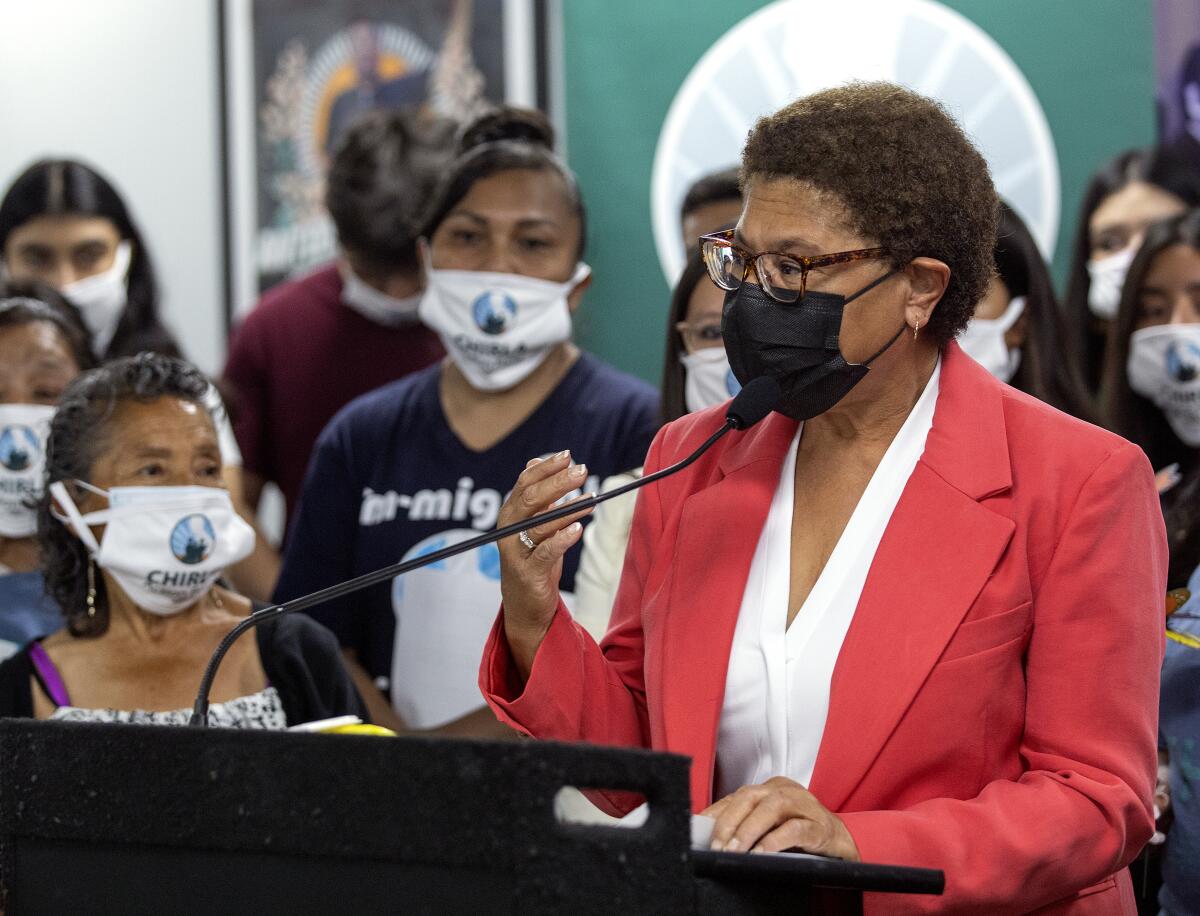Latinos favored Rick Caruso in the L.A. mayoral primary. But they may not swing his way in November

- Share via
As Los Angeles residents decide who will be their mayor, Rep. Karen Bass is trying to build on her seven-point advantage in the primary over billionaire developer Rick Caruso.
But in precincts with large Latino populations, the primary results were different — Caruso generally came out ahead of Bass, according to a Times analysis.
While Latino voters in L.A. have historically leaned progressive, they can have a conservative streak on some issues, including policing. Party affiliation is relatively weak among Latinos, with some identifying as Democrats but willing to cross over for candidates who speak to them on issues, experts said.
With homelessness, crime and affordable housing on voters’ minds this year, Caruso’s pitch that he is an outsider who can fix these problems appealed to Latino voters in the primary and could do so head-to-head with the more liberal Bass.
But turnout is expected to be much higher in the November general election. City Councilman Kevin de León, the only major Latino candidate, had strong support among Latinos in the primary, and it is unclear where those voters will end up.

Latinos, who make up more than a third of the city’s electorate, could still swing for Bass, experts said.
As he did during the primary, Caruso — a former Republican who is now a Democrat — will likely use his fortune to saturate the airwaves, including Spanish-language media.
Bass (D-Los Angeles), a former chair of the Congressional Black Caucus with a strong base in South L.A., will rely on endorsements from Latino leaders, as well as one-on-one meetings and intimate gatherings at homes, to make up for what she lacks in money.
“Those TV ads are effective, but they’re superficial,” said Matt A. Barreto, a researcher with the UCLA Latino Policy & Politics Institute. “Community, door-to-door contact is way more effective.”
In L.A. precincts with populations that are at least 80% Latino, Caruso got 34% of the vote in the primary, and Bass 27%, according to the Times analysis.
De León captured 8% of the overall vote but 24% in those precincts, the analysis showed. He was the top finisher in Boyle Heights, which he represents on the City Council, and received strong support in South-Central, where votes were split almost evenly among the top three candidates.
De León, who has not endorsed Bass or Caruso, has said he will support whichever candidate “has the strongest plan to build pathways into the middle class for the workers who make this city go.”
Boyle Heights and South-Central are areas where a majority of residents earn less than the city’s median income and are renters.
In the San Fernando Valley, voters overall supported Caruso; the same was true in areas with large Latino populations like Sylmar and Pacoima.
A UCLA statistical analysis also showed Caruso as the top finisher among Latinos, with 34% of the vote. De León finished second, with 29%, and Bass had 20%.
At 17%, voter turnout in the Latino-heavy precincts analyzed by The Times was much lower than the overall turnout of 30%. Some see that as an indication that candidates aren’t doing enough to connect with Latino voters.
Lack of outreach leads Latinos to feel disillusioned or disconnected with political leaders and their campaigns, according to Arturo Vargas, executive director of the National Assn. of Latino Elected and Appointed Officials (NALEO) Educational Fund.
Political analysts and voting advocates have urged the candidates to engage with Latinos by meeting them face-to-face in their communities. Bass will need to increase her name recognition outside of South L.A., while Caruso will need to make his message to voters more substantive, experts said.
Bass said her campaign has created a “Latino affinity group” to organize in-person events. She leans on her decades of experience working with Latino activists in South L.A. as a founder of Community Coalition, which attempts to address the root causes of poverty, crime and violence. She has secured endorsements from key Latino politicians, as well as the Coalition for Humane Immigrant Rights, or CHIRLA.
Besides advertising on Spanish-language television, Caruso’s campaign has conducted outreach in Latino neighborhoods like Pacoima and Boyle Heights, said Juan Rodriguez, a political consultant for the candidate.
“That the vote broke down the way it did makes us feel really good about the potential of November,” Rodriguez said.
Sean Rivas, chair of the Democratic Party of the San Fernando Valley, which previously endorsed De León, believes Caruso’s advertisements have made an impact.
“Rick came out swinging. He spent so much money on TV advertising during the peak times, the [telenovela] times and during the day as well,” Rivas said, adding that it “made an impact because he got ahead of the talking points,” including homelessness.
Angelica Salas, CHIRLA’s executive director, said she doesn’t think “slick ads” in Spanish are enough to win over Latino voters.
“I want all candidates to understand we are sophisticated voters,” she said. “We’re people who are paying attention.”
While Caruso’s wealth turns off some voters, it can be a plus for Latinos who see their own journeys reflected in his. Maria S. Salinas, president and chief executive of the L.A. Area Chamber of Commerce, which has endorsed Caruso, said his immigrant and business background, as well as his philanthropy, appeals to Latinos.
“Many Latinos start their own businesses, because that’s the way for economic opportunity,” she said. “Mr. Caruso is an entrepreneur himself. I know he’s a person that is definitely very connected to philanthropic work throughout the city, and he is a man of faith. Those are all qualities that I think appeal to everyday Latinos.”
Maggie Darett-Quiroz sees her immigrant family’s story in Caruso, who is of Italian descent, and doesn’t mind that he has spent millions of his own money on his campaign.
“He’s willing to make a change, and right now, we need the change,” said Darett-Quiroz, who voted for Caruso and is commissioner of Empower L.A., the city department that oversees neighborhood councils. “We can’t stick to the plan anymore.”
Roselia Melgoza, a 73-year-old Boyle Heights resident, said she didn’t vote in the primary and doesn’t know much about the candidates. But she is leaning toward voting for Caruso in November. From friends, family and TV ads, she has gleaned that he comes from an immigrant family that initially settled in Boyle Heights and that he has given to charities. She also thinks he might use his wealth to help the city.
She hasn’t heard anything about Bass.
“One listens to the people who surround you,” she said.
Mireira Moran, a 32-year-old Pacoima resident and member of the neighborhood council, said she supports Bass because of the congresswoman’s experience and political values. But Moran is in the minority, in her neighborhood and on the council. She said people are looking for something different — someone who is not a politician.
“I think, in general, Latinos tend to be more conservative. The Valley tends to be more conservative,” she said. “I think this particular race has come down to homelessness. Caruso did a better job of catering to that sentiment in the community and taking the harsher stance.”
On the Eastside, in Rose Hills, Sylvia Cruz voted for De León in the primary and will switch her support to Bass, she said.
“[Caruso] is a successful entrepreneur. I admire him, but I don’t think he has the experience to address the issue of affordable housing,” said Cruz, president of the neighborhood council that includes the El Sereno area.
Cruz thinks many Latinos feel disenfranchised from liberal politics. She understands why some support Caruso — they see a wealthy businessman as “a role model.”
“You want to be like him,” she said.
More to Read
Sign up for Essential California
The most important California stories and recommendations in your inbox every morning.
You may occasionally receive promotional content from the Los Angeles Times.












